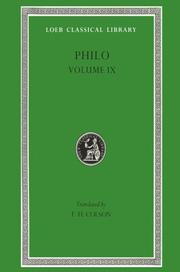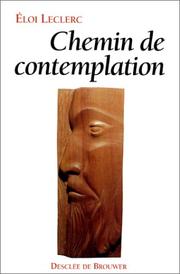| Listing 1 - 10 of 65 | << page >> |
Sort by
|
Book
ISBN: 9782889450947 Year: 2017 Publisher: Frontiers Media SA
Abstract | Keywords | Export | Availability | Bookmark
 Loading...
Loading...Choose an application
- Reference Manager
- EndNote
- RefWorks (Direct export to RefWorks)
There is an emergent movement of scientists and scholars working on somatic awareness, interoception and embodiment. This work cuts across studies of neurophysiology, somatic anthropology, contemplative practice, and mind-body medicine. Key questions include: How is body awareness cultivated? What role does interoception play for emotion and cognition in healthy adults and children as well as in different psychopathologies? What are the neurophysiological effects of this cultivation in practices such as Yoga, mindfulness meditation, Tai Chi and other embodied contemplative practices? What categories from other traditions might be useful as we explore embodiment? Does the cultivation of body awareness within contemplative practice offer a tool for coping with suffering from conditions, such as pain, addiction, and dysregulated emotion? This emergent field of research into somatic awareness and associated interoceptive processes, however, faces many obstacles. The principle obstacle lies in our 400-year Cartesian tradition that views sensory perception as epiphenomenal to cognition. The segregation of perception and cognition has enabled a broad program of cognitive science research, but may have also prevented researchers from developing paradigms for understanding how interoceptive awareness of sensations from inside the body influences cognition. The cognitive representation of interoceptive signals may play an active role in facilitating therapeutic transformation, e.g. by altering context in which cognitive appraisals of well-being occur. This topic has ramifications into disparate research fields: What is the role of interoceptive awareness in conscious presence? How do we distinguish between adaptive and maladaptive somatic awareness? How do we best measure somatic awareness? What are the consequences of dysregulated somatic/interoceptive awareness on cognition, emotion, and behavior? The complexity of these questions calls for the creative integration of perspectives and findings from related but often disparate research areas including clinical research, neuroscience, cognitive psychology, anthropology, religious/contemplative studies and philosophy.
contemplative practice --- interoception --- somatic awareness --- Meditation --- Awareness --- mindfulness --- Body awareness
Book
ISBN: 9789079001224 9789002223723 Year: 2008 Publisher: Antwerpen Kampen Standaard Ten Have
Abstract | Keywords | Export | Availability | Bookmark
 Loading...
Loading...Choose an application
- Reference Manager
- EndNote
- RefWorks (Direct export to RefWorks)
Christian spirituality --- Contemplatie --- Contemplation --- #GGSB: Geestelijke lezing (geel) --- #GGSB: Spiritualiteit --- #gsdb10 --- C1 --- Kerken en religie --- Contemplation (Théologie) --- Contemplation de Dieu --- Contemplation mystique --- Mental prayer --- Méditation contemplative --- Prayer [Mental ] --- Prière contemplative --- Vie contemplative --- Geestelijke lezing (geel) --- Spiritualiteit
Book
ISBN: 9020917641 Year: 1990 Publisher: Tielt : Lannoo,
Abstract | Keywords | Export | Availability | Bookmark
 Loading...
Loading...Choose an application
- Reference Manager
- EndNote
- RefWorks (Direct export to RefWorks)
Christian spirituality --- Contemplatie --- Contemplatieve orden --- Contemplation --- Contemplative orders --- Lecture religieuse --- Ordres contemplatifs --- Religieuze lectuur --- #GGSB: Geestelijke lezing(rood) --- #GGSB: Spiritualiteit --- #gsdb10 --- Contemplation (Théologie) --- Contemplation de Dieu --- Contemplation mystique --- Mental prayer --- Méditation contemplative --- Prayer [Mental ] --- Prière contemplative --- Vie contemplative --- Geestelijke lezing(rood) --- Spiritualiteit
Book
Abstract | Keywords | Export | Availability | Bookmark
 Loading...
Loading...Choose an application
- Reference Manager
- EndNote
- RefWorks (Direct export to RefWorks)
A recent wave of brain research has advanced our understanding of the neural mechanisms of conscious states, contents and functions. A host of questions remain to be explored, as shown by lively debates between models of higher vs. lower-order aspects of consciousness, as well as global vs. local models. (Baars 2007; Block, 2009; Dennett and Cohen, 2011; Lau and Rosenthal, 2011). Over some twenty-five centuries the contemplative traditions have also developed explicit descriptions and taxonomies of the mind, to interpret experiences that are often reported in contemplative practices (Radhakrishnan & Moore, 1967; Rinbochay & Naper, 1981). These traditional descriptions sometimes converge on current scientific debates, such as the question of conceptual vs. non-conceptual consciousness; reflexivity or “self-knowing” associated with consciousness; the sense of self and consciousness; and aspects of consciousness that are said to continue during sleep. These real or claimed aspects of consciousness have not been fully integrated into scientific models so far. This Research Topic in Consciousness Research aims to provide a forum for theoretical proposals, new empirical findings, integrative literature reviews, and methodological improvements inspired by meditation-based models. We include a broad array of topics, including but not limited to: replicable findings from a variety of systematic mental practices; changes in brain functioning and organization that can be attributed to such practices; their effects on adaptation and neural plasticity; measurable effects on perception, cognition, affect and self-referential processes. We include contributions that address the question of causal attribution. Many published studies are correlational in nature, because of the inherent difficulty of conducting longitudinal experiments based on a major lifestyle decision, such as the decision to commit to a mental practice over a period of years. We also feature clinical and case studies, integrative syntheses and significant opinion articles.
contemplative practice --- structural plasticity --- functional plasticity --- Meditation --- mindfulness --- neural correlates of consciousness --- Cultural issues

ISBN: 0674994000 Year: 1941 Publisher: Cambridge, MA : Harvard University Press,
Abstract | Keywords | Export | Availability | Bookmark
 Loading...
Loading...Choose an application
- Reference Manager
- EndNote
- RefWorks (Direct export to RefWorks)
Book
ISBN: 9789031739110 Year: 2014 Publisher: Averbode : Altiora,
Abstract | Keywords | Export | Availability | Bookmark
 Loading...
Loading...Choose an application
- Reference Manager
- EndNote
- RefWorks (Direct export to RefWorks)
Dit boek biedt gebedsbezinningen bij de evangelieteksten van het B-jaar. Ze zijn ontstaan vanuit lectio divina, elke keer individueel en soms ook met een groep. De gebruikte methode bestaat uit vijf stappen : statio, lectio, meditatio, oratio en contemplatio, actio. Alle gebedsbezinningen zijn opgebouwd volgens hetzelfde schema: • het Woord: de evangelietekst • stilte bij het Woord: om het Woord te laten indringen • een woord bij het Woord: bezinning • het Woord in mijn leven: vragen die aanzetten tot actualisering (en gesprek) • bidden met het Woord: communicatie met God de Vader, God de Zoon, God de Heilige Geest. Deze gebedsbezinningen zijn uiterst geschikt om een bijeenkomst of vergadering te beginnen of te beëindigen, als morgen- of avondgebed, als inspiratie voor een homilie, als basis voor een gesprek in een pastorale groep, een gezinsgroep, met een koppel, een groep catechisten, in een gemeenschap of een parochieploeg
Liturgy --- Contemplatie --- Contemplation --- C1 --- liturgie --- Bijbel --- #GGSB: Geestelijke lezing(rood) --- #GGSB: Liturgie --- Kerken en religie --- #gsdb12 --- Contemplation (Théologie) --- Contemplation de Dieu --- Contemplation mystique --- Mental prayer --- Méditation contemplative --- Prayer [Mental ] --- Prière contemplative --- Vie contemplative --- 245.8 --- katholicisme --- gebeden --- evangelie --- bezinningsteksten --- katholicisme - stichtelijke lectuur --- Bible --- Devotional use --- Spiritual life --- Catholic Church --- Geestelijke lezing(rood) --- Liturgie
Book
ISBN: 3769615263 Year: 1983 Volume: vol Jrg. 1983, Heft 7
Abstract | Keywords | Export | Availability | Bookmark
 Loading...
Loading...Choose an application
- Reference Manager
- EndNote
- RefWorks (Direct export to RefWorks)
Beatific vision --- Contemplation --- Visions --- Parapsychology --- Religion --- Visionaries --- Mental prayer --- Prayer, Mental --- Contemplative orders --- Meditation --- Mysticism --- Prayer --- Vision, Beatific --- Heaven --- History of doctrines --- Philosophie byzantine --- Reve
Book
ISBN: 9780748696048 0748696040 9780748696024 0748696024 9780748696055 9780748696031 0748696032 0748696059 Year: 2016 Publisher: Edinburgh Edinburgh University Press
Abstract | Keywords | Export | Availability | Bookmark
 Loading...
Loading...Choose an application
- Reference Manager
- EndNote
- RefWorks (Direct export to RefWorks)
In the context of a frantic world that celebrates instantaneity and speed, a number of cinemas steeped in contemplation, silence and duration have garnered significant critical attention in recent years, thus resonating with a larger sociocultural movement whose aim is to rescue extended temporal structures from the accelerated tempo of late-capitalism. Although not part of a structured film movement, directors such as Carlos Reygadas, Tsai Ming-liang, Béla Tarr, Pedro Costa and Kelly Reichardt have been largely subsumed under the term ‘slow cinema’. But what exactly is slow cinema? Is it a strictly recent phenomenon or an overarching cinematic tradition? And how exactly do slow cinemas interrelate on an aesthetic, technical and political level?Deploying the concept of slowness as an umbrella category under which filmmakers and traditions from different historical and geographical backgrounds can fruitfully converge, this innovative collection of essays interrogates and expands the frameworks that have generally informed slow cinema debates. Repositioning the term in a broader theoretical space, the book combines an array of fine-grained studies that will provide valuable insight into the notion of slowness in the cinema, while mapping out past and contemporary slow films across the globe.
Slow cinema. --- Motion pictures --- Aesthetics. --- Film --- PERFORMING ARTS / Film & Video / Direction & Production. --- Cinema of contemplation --- Cinema of slowness --- Contemplative cinema --- Slow films --- Motion pictures.

ISBN: 1135994722 1280244208 9786610244201 0203462084 1135994714 041570068X 0415700698 Year: 2005 Publisher: Abingdon, Oxon : Routledge,
Abstract | Keywords | Export | Availability | Bookmark
 Loading...
Loading...Choose an application
- Reference Manager
- EndNote
- RefWorks (Direct export to RefWorks)
Contemplative landscape and contemplative space are familiar terms in the areas of design, landscape architecture and architecture. Krinke and her highly regarded contributors set out to explore definitions, theories, and case studies of contemplative landscapes. The contributors, Marc Treib, John Beardsley, Michael Singer, Lance Neckar, Heinrich Hermann and Rebecca Krinke have spent their careers researching, critiquing, and making landscapes. Here they investigate the role of contemplative space in a post-modern world and examine the impact of nature and culture on the design or interpret
Sanctuary gardens. --- Spiritual retreats. --- Religious retreats --- Retreats --- Spiritual life --- Gardens --- Gardening to attract wildlife --- contemplative --- space --- architecture --- experience --- vietnam --- veterans --- memorial --- woodland --- cemetery --- response --- Landschapsarchitectuur ; filosofie

ISBN: 2220036014 9782220036014 Year: 1995 Publisher: Paris: Desclée De Brouwer,
Abstract | Keywords | Export | Availability | Bookmark
 Loading...
Loading...Choose an application
- Reference Manager
- EndNote
- RefWorks (Direct export to RefWorks)
Contemplation --- #GGSB: Geestelijke lezing (geel) --- #GGSB: Spiritualiteit --- #gsdb10 --- Mental prayer --- Prayer, Mental --- Contemplative orders --- Meditation --- Mysticism --- Prayer --- Geestelijke lezing (geel) --- Spiritualiteit --- Contemplation. --- Geestelijke lezing (geel). --- Spiritualiteit. --- gsdb10.
| Listing 1 - 10 of 65 | << page >> |
Sort by
|

 Search
Search Feedback
Feedback About UniCat
About UniCat  Help
Help News
News